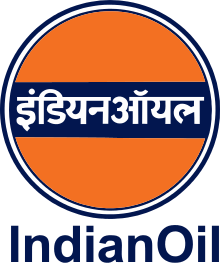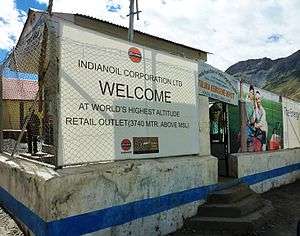Indian Oil Corporation
 | |
| Public | |
| Traded as |
BSE: 530965 NSE: IOC |
| Industry | Oil and Gas |
| Founded | 1959 |
| Headquarters | New Delhi, India |
Key people | Mr. Sanjiv Singh (Chairman) |
| Products | Fuels, lubricants, petrochemicals |
| Revenue | ₹4.45526 trillion (US$66 billion) (2015)[1] |
| ₹105.50 billion (US$1.6 billion) (2015)[1] | |
| ₹48.71 billion (US$720 million) (2015)[1] | |
| Total assets | ₹1.28059 trillion (US$19 billion) (2015)[1] |
Number of employees | 34,659 (2016)[1] |
| Website |
www |
Indian Oil Corporation (IndianOil) is India's Largest Commercial Enterprise, with a net profit of ₹103.99 billion (US$1.5 billion) for the financial year 2015-16.[2]
Standing true to its corporate vision of being ‘The Energy of India’, IndianOil has been successfully meeting the energy demands of India for more than five decades. It is the leading Indian Corporate in Fortune's prestigious ‘Global 500’ listing of world's largest corporates at 161st position for the year 2016,[3] and has a 33,000 strong workforce.
IndianOil's business interests overlap the entire hydrocarbon value-chain, including refining, pipeline transportation, marketing of petroleum products, exploration and production of crude oil, natural gas and petrochemicals. Also, IndianOil has ventured into alternative energy and globalisation of downstream operations. With subsidiaries in Sri Lanka, Mauritius and the UAE, IndianOil is scouting for new business opportunities in the energy markets across Asia and Africa. It has also formed about 20 joint ventures with reputed business partners from India and abroad to pursue diverse business interests.
Downstream major

IndianOil accounts for nearly half of India's petroleum products market share, 35% national refining capacity (together with its subsidiary Chennai Petroleum Corporation Ltd., or CPCL), and 71% downstream sector pipelines through capacity. The IndianOil Group owns and operates 11 of India's 23 refineries with a combined refining capacity of 80.7 MMTPA (million metric tonnes per annum). IndianOil's cross-country pipeline network, for transportation of crude oil to refineries and finished products to high-demand centres, spans over 11,220 km. With a throughput capacity of 80.49 MMTPA for crude oil and petroleum products and 9.5 MMSCMD for gas, this network meets the vital energy needs of the consumers in an efficient, economical and environment-friendly manner. With a portfolio that is bedecked with leading energy brands like XTRAPREMIUM petrol, XTRAMILE diesel and PROPEL petrochemicals, IndianOil's SERVO lubricants and Indane LPG have earned the coveted Superbrand status.
Refineries
IOCL has various refineries across India:
- Digboi Refinery
- Guwahati Refinery
- Bongaigaon Refinery
- Barauni Refinery
- Gujarat Refinery
- Haldia Refinery
- Mathura Refinery
- Panipat Refinery is being expanded.[4]
- Paradip Refinery - The 15 million tonnes per annum refinery in Paradip in Coastal Odisha has been inaugurated by PM Narendra Modi on 7 February 2016.[5]
International rankings
- IndianOil is the highest ranked Indian company in the Fortune Global 500 listing, at the 161th position in 2016. It is also the 18th largest petroleum company in the world and the No. 1 petroleum trading company among the national oil companies in the Asia-Pacific region.
- IOCL was featured on the 2011 Forbes Global 2000 at position 243.
- It is the fifth most valued brand in India according to an annual survey conducted by Brand Finance and The Economic Times in 2010.[6]
Employees
As of 31 March 2013, the company had 34,084 employees, out of which 2643 were women (7.8%). Its workforce includes 14,981 officers.[7] The attrition rate in IndianOil is around 1.5%.[8] The company incurred INR 78 billion on employee benefits during the FY 2012-13.[7]
Listing and shareholding
IndianOil's equity shares are listed on the Bombay Stock Exchange and National Stock Exchange of India.[9]
As of 23 August 2015, the promoters Government of India held approx. 68.57% of the shares in IndianOil. ONGC held approx. 9% of the shares. Remaining 12% of the shares are held by others.[10] On 23 August 2015, the Government of India reduced its stake by another 10% bringing the number shares held to 58.57%.[11]
| Shareholders (as on 23-August-2015) | Shareholding[10] |
|---|---|
| Promoter Group (Government of India) | 58.57% |
| private single body | 40.13% |
| Insurance Companies | 01.50% |
| Individual shareholders | 0.83% |
| Trusts | 0.42% |
| Foreign Institutional Investors (FII) | 0.13% |
| Others | 0.07% |
| Total | 100.0% |
Competitors
Indian Oil Corporation has two major domestic competitors, Bharat Petroleum and Hindustan Petroleum. Both are state-controlled, like Indian Oil Corporation. There are two private competitors: Reliance Industries and Essar Oil.
Oil Industry Development Board
India has begun the development of a strategic crude oil reserve sized at 37.4 million barrels (5,950,000 m3), enough for two weeks of consumption.[12] Petroleum stocks have been transferred from the Indian Oil Corporation (IndianOil) to the Oil Industry Development Board (OIDB).[13] The OIDB then created the Indian Strategic Petroleum Reserves Ltd (ISPRL) to serve as the controlling government agency for the strategic reserve.[14]
See also
References
- 1 2 3 4 5 "Financial Statement - Indian Oil Corporation Limited". MoneyControl. Retrieved 27 January 2014.
- ↑ "Fortune Global 500 List (India)". Golbal500. Retrieved 22 July 2016.
- ↑ .www.financialexpress.com
- ↑ "IOC mulls expanding capacity at Panipat refinery to 21 million tonne". The Economic Times. Retrieved 29 November 2013.
- ↑ "PM Narendra Modi Inaugurates Indian Oil's Paradip Refinery". NDTV.com. 7 February 2016.
- ↑ "India's top 10 brands". Rediff.com. Retrieved 26 October 2010.
- 1 2 "IOCL - Annual Report 2012-13" (PDF). BSE India. Retrieved 26 January 2014.
- ↑ "HighTea Chat Transcript with Mr. Biswajit Roy: GM (HRD), Indian Oil Corporation". Times Jobs. 22 January 2014. Retrieved 26 January 2014.
- ↑ "Listing Information - Indian Oil Corporation Limited". Economic Times. Retrieved 27 January 2014.
- ↑ "Govt to sell 10% stake in Indian Oil Corporation on Monday". The Times of India.
- ↑ "Alexander's Gas & Oil Connections – India to build up storage of crude oil". Gasandoil.com. 21 September 2004. Retrieved 26 August 2010.
- ↑ "Strategic oil reserves to come directly under Govt". The Hindu Business Line. 2 April 2006. Retrieved 26 August 2010.
- ↑ "'India to form crude oil reserve of 5 mmt'- Oil & Gas-Energy-News By Industry-News-The Economic Times". Economictimes.indiatimes.com. 20 June 2007. Retrieved 26 August 2010.
- ↑ http://www.topnews.in/sonia-lay-foundation-rajiv-gandhi-petroleum-institute-rae-bareli-221339